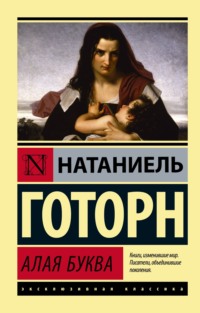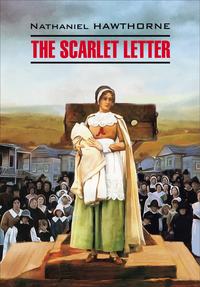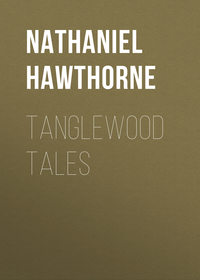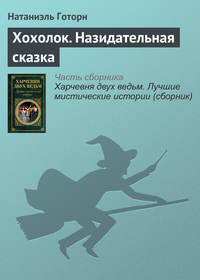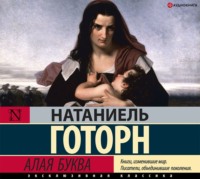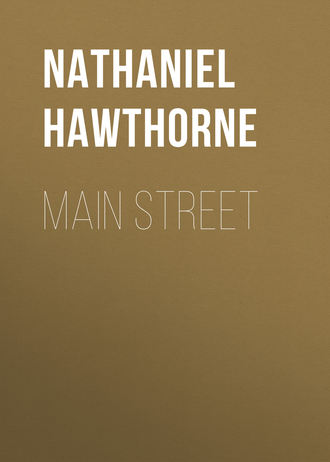
Main Street
Have you not already detected a quaint, sly humor in that face,—an eccentricity in the manner,—a certain indescribable waywardness,—all the marks, in short, of an original man, unmistakably impressed, yet kept down by a sense of clerical restraint? That is Nathaniel Ward, the minister of Ipswich, but better remembered as the simple cobbler of Agawam. He hammered his sole so faithfully, and stitched his upper-leather so well, that the shoe is hardly yet worn out, though thrown aside for some two centuries past. And next, among these Puritans and Roundheads, we observe the very model of a Cavalier, with the curling lovelock, the fantastically trimmed beard, the embroidery, the ornamented rapier, the gilded dagger, and all other foppishnesses that distinguished the wild gallants who rode headlong to their overthrow in the cause of King Charles. This is Morton of Merry Mount, who has come hither to hold a council with Endicott, but will shortly be his prisoner. Yonder pale, decaying figure of a white-robed woman, who glides slowly along the street, is the Lady Arabella, looking for her own grave in the virgin soil. That other female form, who seems to be talking—we might almost say preaching or expounding—in the centre of a group of profoundly attentive auditors, is Ann Hutchinson. And here comes Vane—
“But, my dear sir,” interrupts the same gentleman who before questioned the showman’s genealogical accuracy, “allow me to observe that these historical personages could not possibly have met together in the Main Street. They might, and probably did, all visit our old town, at one time or another, but not simultaneously; and you have fallen into anachronisms that I positively shudder to think of!”
“The fellow,” adds the scarcely civil critic, “has learned a bead-roll of historic names, whom he lugs into his pictorial puppet-show, as he calls it, helter-skelter, without caring whether they were contemporaries or not,—and sets them all by the ears together. But was there ever such a fund of impudence? To hear his running commentary, you would suppose that these miserable slips of painted pasteboard, with hardly the remotest outlines of the human figure, had all the character and expression of Michael Angele’s pictures. Well! go on, sir!”
“Sir, you break the illusion of the scene,” mildly remonstrates the showman.
“Illusion! What illusion?” rejoins the critic, with a contemptuous snort. “On the word of a gentleman, I see nothing illusive in the wretchedly bedaubed sheet of canvas that forms your background, or in these pasteboard slips that hitch and jerk along the front. The only illusion, permit me to say, is in the puppet-showman’s tongue,—and that but a wretched one, into the bargain!”
“We public men,” replies the showman, meekly, “must lay our account, sometimes, to meet an uncandid severity of criticism. But—merely for your own pleasure, sir—let me entreat you to take another point of view. Sit farther back, by that young lady, in whose face I have watched the reflection of every changing scene; only oblige me by sitting there; and, take my word for it, the slips of pasteboard shall assume spiritual life, and the bedaubed canvas become an airy and changeable reflex of what it purports to represent.”
“I know better,” retorts the critic, settling himself in his seat, with sullen but self-complacent immovableness. “And, as for my own pleasure, I shall best consult it by remaining precisely where I am.”
The showman bows, and waves his hand; and, at the signal, as if time and vicissitude had been awaiting his permission to move onward, the mimic street becomes alive again.
Years have rolled over our scene, and converted the forest-track into a dusty thoroughfare, which, being intersected with lanes and cross-paths, may fairly be designated as the Main Street. On the ground-sites of many of the log-built sheds, into which the first settlers crept for shelter, houses of quaint architecture have now risen. These later edifices are built, as you see, in one generally accordant style, though with such subordinate variety as keeps the beholder’s curiosity excited, and causes each structure, like its owner’s character, to produce its own peculiar impression. Most of them have a huge chimney in the centre, with flues so vast that it must have been easy for the witches to fly out of them as they were wont to do, when bound on an aerial visit to the Black Man in the forest. Around this great chimney the wooden house clusters itself, in a whole community of gable-ends, each ascending into its own karate peak; the second story, with its lattice-windows, projecting over the first; and the door, which is perhaps arched, provided on the outside with an iron hammer, wherewith the visitor’s hand may give a thundering rat-a-tat.
The timber framework of these houses, as compared with those of recent date, is like the skeleton of an old giant, beside the frail bones of a modern man of fashion. Many of them, by the vast strength and soundness of their oaken substance, have been preserved through a length of time which would have tried the stability of brick and stone; so that, in all the progressive decay and continual reconstruction of the street, down our own days, we shall still behold these old edifices occupying their long-accustomed sites. For instance, on the upper corner of that green lane which shall hereafter be North Street, we see the Curwen House, newly built, with the carpenters still at work on the roof nailing down the last sheaf of shingles. On the lower corner stands another dwelling,—destined, at some period of its existence, to be the abode of an unsuccessful alchemist,—which shall likewise survive to our own generation, and perhaps long outlive it. Thus, through the medium of these patriarchal edifices, we have now established a sort of kindred and hereditary acquaintance with the Main Street.
Great as is the transformation produced by a short term of years, each single day creeps through the Puritan settlement sluggishly enough. It shall pass before your eyes, condensed into the space of a few moments. The gray light of early morning is slowly diffusing itself over the scene; and the bellman, whose office it is to cry the hour at the street-corners, rings the last peal upon his hand bell, and goes wearily homewards, with the owls, the bats, and other creatures of the night. Lattices are thrust back on their hinges, as if the town were opening its eyes, in the summer morning. Forth stumbles the still drowsy cowherd, with his horn; putting which to his lips, it emits a bellowing bray, impossible to be represented in the picture, but which reaches the pricked-up ears of every cow in the settlement, and tells her that the dewy pasture-hour is come. House after house awakes, and sends the smoke up curling from its chimney, like frosty breath from living nostrils; and as those white wreaths of smoke, though impregnated with earthy admixtures, climb skyward, so, from each dwelling, does the morning worship—its spiritual essence, bearing up its human imperfection—find its way to the heavenly Father’s throne.
The breakfast-hour being passed, the inhabitants do not, as usual, go to their fields or workshops, but remain within doors; or perhaps walk the street, with a grave sobriety, yet a disengaged and unburdened aspect, that belongs neither to a holiday nor a Sabbath. And, indeed, this passing day is neither, nor is it a common week-day, although partaking of all the three. It is the Thursday Lecture; an institution which New England has long ago relinquished, and almost forgotten, yet which it would have been better to retain, as bearing relations to both the spiritual and ordinary life, and bringing each acquainted with the other. The tokens of its observance, however, which here meet our eyes, are of rather a questionable cast. It is, in one sense, a day of public shame; the day on which transgressors, who have made themselves liable to the minor severities of the Puritan law receive their reward of ignominy. At this very moment, this constable has bound an idle fellow to the whipping-post, and is giving him his deserts with a cat-o’-nine tails. Ever since sunrise, Daniel Fairfield has been standing on the steps of the meeting-house, with a halter about his neck, which he is condemned to wear visibly throughout his lifetime; Dorothy Talby is chained to a post at the corner of Prison Lane, with the hot sun blazing on her matronly face, and all for no other offence than lifting her hand against her husband; while, through the bars of that great wooden cage, in the centre of the scene, we discern either a human being or a wild beast, or both in one, whom this public infamy causes to roar, and gnash his teeth, and shake the strong oaken bars, as if he would breakforth, and tear in pieces the little children who have been peeping at him. Such are the profitable sights that serve the good people to while away the earlier part of lecture-day. Betimes in the forenoon, a traveller—the first traveller that has come hitherward this morning-rides slowly into the street on his patient steed. He seems a clergyman; and, as he draws near, we recognize the minister of Lynn, who was pre-engaged to lecture here, and has been revolving his discourse, as he rode through the hoary wilderness. Behold, now, the whole town thronging into the meeting-house, mostly with such sombre visages that the sunshine becomes little better than a shadow when it falls upon them. There go the Thirteen Men, grim rulers of a grim community! There goes John Massey, the first town-born child, now a youth of twenty, whose eye wanders with peculiar interest towards that buxom damsel who comes up the steps at the same instant. There hobbles Goody Foster, a sour and bitter old beldam, looking as if she went to curse, and not to pray, and whom many of her neighbors suspect of taking an occasional airing on a broomstick. There, too, slinking shamefacedly in, you observe that same poor do-nothing and good-for-nothing whom we saw castigated just now at the whipping-post. Last of all, there goes the tithing-man, lugging in a couple of small boys, whom he has caught at play beneath God’s blessed sunshine, in a back lane. What native of Naumkeag, whose recollections go back more than thirty years, does not still shudder at that dark ogre of his infancy, who perhaps had long ceased to have an actual existence, but still lived in his childish belief, in a horrible idea, and in the nurse’s threat, as the Tidy Man!
It will be hardly worth our while to wait two, or it may be three, turnings of the hour-glass, for the conclusion of the lecture. Therefore, by my control over light and darkness, I cause the dusk, and then the starless night, to brood over the street; and summon forth again the bellman, with his lantern casting a gleam about his footsteps, to pace wearily from corner to corner, and shout drowsily the hour to drowsy or dreaming ears. Happy are we, if for nothing else, yet because we did not live in those days. In truth, when the first novelty and stir of spirit had subsided,—when the new settlement, between the forest-border and the sea, had become actually a little town,—its daily life must have trudged onward with hardly anything to diversify and enliven it, while also its rigidity could not fail to cause miserable distortions of the moral nature. Such a life was sinister to the intellect, and sinister to the heart; especially when one generation had bequeathed its religious gloom, and the counterfeit of its religious ardor, to the next; for these characteristics, as was inevitable, assumed the form both of hypocrisy and exaggeration, by being inherited from the example and precept of other human beings, and not from an original and spiritual source. The sons and grandchildren of the first settlers were a race of lower and narrower souls than their progenitors had been. The latter were stern, severe, intolerant, but not superstitious, not even fanatical; and endowed, if any men of that age were, with a far-seeing worldly sagacity. But it was impossible for the succeeding race to grow up, in heaven’s freedom, beneath the discipline which their gloomy energy of character had established; nor, it may be, have we even yet thrown off all the unfavorable influences which, among many good ones, were bequeathed to us by our Puritan forefathers. Let us thank God for having given us such ancestors; and let each successive generation thank him, not less fervently, for being one step further from them in the march of ages.
“What is all this?” cries the critic. “A sermon? If so, it is not in the bill.”
“Very true,” replies the showman; “and I ask pardon of the audience.”
Look now at the street, and observe a strange people entering it. Their garments are torn and disordered, their faces haggard, their figures emaciated; for they have made their way hither through pathless deserts, suffering hunger and hardship, with no other shelter thin a hollow tree, the lair of a wild beast, or an Indian wigwam. Nor, in the most inhospitable and dangerous of such lodging-places, was there half the peril that awaits them in this thoroughfare of Christian men, with those secure dwellings and warm hearths on either side of it, and yonder meeting-house as the central object of the scene. These wanderers have received from Heaven a gift that, in all epochs of the world, has brought with it the penalties of mortal suffering and persecution, scorn, enmity, and death itself;—a gift that, thus terrible to its possessors, has ever been most hateful to all other men, since its very existence seems to threaten the overthrow of whatever else the toilsome ages have built up;—the gift of a new idea. You can discern it in them, illuminating their faces—their whole persons, indeed, however earthly and cloddish—with a light that inevitably shines through, and makes the startled community aware that these men are not as they themselves are,—not brethren nor neighbors of their thought. Forthwith, it is as if an earthquake rumbled through the town, making its vibrations felt at every hearthstone, and especially causing the spire of the meeting-house to totter. The Quakers have come. We are in peril! See! they trample upon our wise and well-established laws in the person of our chief magistrate; for Governor Endicott is passing, now an aged man, and dignified with long habits of authority,—and not one of the irreverent vagabonds has moved his bat. Did you note the ominous frown of the white-bearded Puritan governor, as he turned himself about, and, in his anger, half uplifted the staff that has become a needful support to his old age? Here comes old Mr. Norris, our venerable minister. Will they doff their hats, and pay reverence to him? No: their hats stick fast to their ungracious heads, as if they grew there; and—impious varlets that they are, and worse than the heathen Indians!—they eye our reverend pastor with a peculiar scorn, distrust, unbelief, and utter denial of his sanctified pretensions, of which he himself immediately becomes conscious; the more bitterly conscious, as he never knew nor dreamed of the like before.
But look yonder! Can we believe our eyes? A Quaker woman, clad in sackcloth, and with ashes on her head, has mounted the steps of the meeting-house. She addresses the people in a wild, shrill voice,—wild and shrill it must be to suit such a figure,—which makes them tremble and turn pale, although they crowd open-mouthed to hear her. She is bold against established authority; she denounces the priest and his steeple-house. Many of her hearers are appalled; some weep; and others listen with a rapt attention, as if a living truth had now, for the first time, forced its way through the crust of habit, reached their hearts, and awakened them to life. This matter must be looked to; else we have brought our faith across the seas with us in vain; and it had been better that the old forest were still standing here, waving its tangled boughs and murmuring to the sky out of its desolate recesses, instead of this goodly street, if such blasphemies be spoken in it.
So thought the old Puritans. What was their mode of action may be partly judged from the spectacles which now pass before your eyes. Joshua Buffum is standing in the pillory. Cassandra Southwick is led to prison. And there a woman, it is Ann Coleman,—naked from the waist upward, and bound to the tail of a cart, is dragged through the Main Street at the pace of a brisk walk, while the constable follows with a whip of knotted cords. A strong-armed fellow is that constable; and each time that he flourishes his lash in the air, you see a frown wrinkling and twisting his brow, and, at the same instant, a smile upon his lips. He loves his business, faithful officer that he is, and puts his soul into every stroke, zealous to fulfil the injunction of Major Hawthorne’s warrant, in the spirit and to the letter. There came down a stroke that has drawn blood! Ten such stripes are to be given in Salem, ten in Boston, and ten in Dedham; and, with those thirty stripes of blood upon her, she is to be driven into the forest. The crimson trail goes wavering along the Main Street; but Heaven grant that, as the rain of so many years has wept upon it, time after time, and washed it all away, so there may have been a dew of mercy, to cleanse this cruel blood-stain out of the record of the persecutor’s life!
Pass on, thou spectral constable, and betake thee to thine own place of torment. Meanwhile, by the silent operation of the mechanism behind the scenes, a considerable space of time would seem to have lapsed over the street. The older dwellings now begin to look weather-beaten, through the effect of the many eastern storms that have moistened their unpainted shingles and clapboards, for not less than forty years. Such is the age we would assign to the town, judging by the aspect of John Massey, the first town-born child, whom his neighbors now call Goodman Massey, and whom we see yonder, a grave, almost autumnal-looking man, with children of his own about him. To the patriarchs of the settlement, no doubt, the Main Street is still but an affair of yesterday, hardly more antique, even if destined to be more permanent, than a path shovelled through the snow. But to the middle-aged and elderly men who came hither in childhood or early youth, it presents the aspect of a long and well-established work, on which they have expended the strength and ardor of their life. And the younger people, native to the street, whose earliest recollections are of creeping over the paternal threshold, and rolling on the grassy margin of the track, look at it as one of the perdurable things of our mortal state,—as old as the hills of the great pasture, or the headland at the harbor’s mouth. Their fathers and grandsires tell them how, within a few years past, the forest stood here, with but a lonely track beneath its tangled shade. Vain legend! They cannot make it true and real to their conceptions. With them, moreover, the Main Street is a street indeed, worthy to hold its way with the thronged and stately avenues of cities beyond the sea. The old Puritans tell them of the crowds that hurry along Cheapside and Fleet Street and the Strand, and of the rush of tumultuous life at Temple Bar. They describe London Bridge, itself a street, with a row of houses on each side. They speak of the vast structure of the Tower, and the solemn grandeur of Westminster Abbey. The children listen, and still inquire if the streets of London are longer and broader than the one before their father’s door; if the Tower is bigger than the jail in Prison Lane; if the old Abbey will hold a larger congregation than our meeting-house. Nothing impresses them, except their own experience.
It seems all a fable, too, that wolves have ever prowled here; and not less so, that the Squaw Sachem, and the Sagamore her son, once ruled over this region, and treated as sovereign potentates with the English settlers, then so few and storm-beaten, now so powerful. There stand some school-boys, you observe, in a little group around a drunken Indian, himself a prince of the Squaw Sachem’s lineage. He brought hither some beaver-skins for sale, and has already swallowed the larger portion of their price, in deadly draughts of firewater. Is there not a touch of pathos in that picture? and does it not go far towards telling the whole story of the vast growth and prosperity of one race, and the fated decay of another?—the children of the stranger making game of the great Squaw Sachem’s grandson!
But the whole race of red men have not vanished with that wild princess and her posterity. This march of soldiers along the street betokens the breaking out of King Philip’s war; and these young men, the flower of Essex, are on their way to defend the villages on the Connecticut; where, at Bloody Brook, a terrible blow shall be smitten, and hardly one of that gallant band be left alive. And there, at that stately mansion, with its three peaks in front, and its two little peaked towers, one on either side of the door, we see brave Captain Gardner issuing forth, clad in his embroidered buff-coat, and his plumed cap upon his head. His trusty sword, in its steel scabbard, strikes clanking on the doorstep. See how the people throng to their doors and windows, as the cavalier rides past, reining his mettled steed so gallantly, and looking so like the very soul and emblem of martial achievement,—destined, too, to meet a warrior’s fate, at the desperate assault on the fortress of the Narragansetts!
“The mettled steed looks like a pig,” interrupts the critic, “and Captain Gardner himself like the Devil, though a very tame one, and on a most diminutive scale.”
“Sir, sir!” cries the persecuted showman, losing all patience,—for, indeed, he had particularly prided himself on these figures of Captain Gardner and his horse,—“I see that there is no hope of pleasing you. Pray, sir, do me the favor to take back your money, and withdraw!”
“Not I!” answers the unconscionable critic. “I am just beginning to get interested in the matter. Come! turn your crank, and grind out a few more of these fooleries!”
The showman rubs his brow impulsively, whisks the little rod with which he points out the notabilities of the scene, but, finally, with the inevitable acquiescence of all public servants, resumes his composure and goes on.
Pass onward, onward, Time! Build up new houses here, and tear down thy works of yesterday, that have already the rusty moss upon them! Summon forth the minister to the abode of the young maiden, and bid him unite her to the joyful bridegroom! Let the youthful parents carry their first-born to the meeting-house, to receive the baptismal rite! Knock at the door, whence the sable line of the funeral is next to issue! Provide other successive generations of men, to trade, talk, quarrel, or walk in friendly intercourse along the street, as their fathers did before them! Do all thy daily and accustomed business, Father Time, in this thoroughfare, which thy footsteps, for so many years, have now made dusty! But here, at last, thou leadest along a procession which, once witnessed, shall appear no more, and be remembered only as a hideous dream of thine, or a frenzy of thy old brain.
“Turn your crank, I say,” bellows the remorseless critic, “and grind it out, whatever it be, without further preface!”
The showman deems it best to comply.
Then, here comes the worshipful Captain Curwen, sheriff of Essex, on horseback, at the head of an armed guard, escorting a company of condemned prisoners from the jail to their place of execution on Gallows Hill. The witches! There is no mistaking them! The witches! As they approach up Prison Lane, and turn into the Main Street, let us watch their faces, as if we made a part of the pale crowd that presses so eagerly about them, yet shrinks back with such shuddering dread, leaving an open passage betwixt a dense throng on either side. Listen to what the people say.
There is old George Jacobs, known hereabouts, these sixty years, as a man whom we thought upright in all his way of life, quiet, blameless, a good husband before his pious wife was summoned from the evil to come, and a good father to the children whom she left him. Ah! but when that blessed woman went to heaven, George Jacobs’s heart was empty, his hearth lonely, his life broken tip; his children were married, and betook themselves to habitations of their own; and Satan, in his wanderings up and down, beheld this forlorn old man, to whom life was a sameness and a weariness, and found the way to tempt him. So the miserable sinner was prevailed with to mount into the air, and career among the clouds; and he is proved to have been present at a witch-meeting as far off as Falmouth, on the very same night that his next neighbors saw him, with his rheumatic stoop, going in at his own door. There is John Willard, too; an honest man we thought him, and so shrewd and active in his business, so practical, so intent on every-day affairs, so constant at his little place of trade, where he bartered English goods for Indian corn and all kinds of country produce! How could such a man find time, or what could put it into his mind, to leave his proper calling, and become a wizard? It is a mystery, unless the Black Man tempted him with great heaps of gold. See that aged couple,—a sad sight, truly,—John Proctor, and his wife Elizabeth. If there were two old people in all the county of Essex who seemed to have led a true Christian life, and to be treading hopefully the little remnant of their earthly path, it was this very pair. Yet have we heard it sworn, to the satisfaction of the worshipful Chief-Justice Sewell, and all the court and jury, that Proctor and his wife have shown their withered faces at children’s bedsides, mocking, making mouths, and affrighting the poor little innocents in the night-time. They, or their spectral appearances, have stuck pins into the Afflicted Ones, and thrown them into deadly fainting-fits with a touch, or but a look. And, while we supposed the old man to be reading the Bible to his old wife,—she meanwhile knitting in the chimney-corner,—the pair of hoary reprobates have whisked up the chimney, both on one broomstick, and flown away to a witch-communion, far into the depths of the chill, dark forest. How foolish! Were it only for fear of rheumatic pains in their old bones, they had better have stayed at home. But away they went; and the laughter of their decayed, cackling voices has been heard at midnight, aloft in the air. Now, in the sunny noontide, as they go tottering to the gallows, it is the Devil’s turn to laugh.



